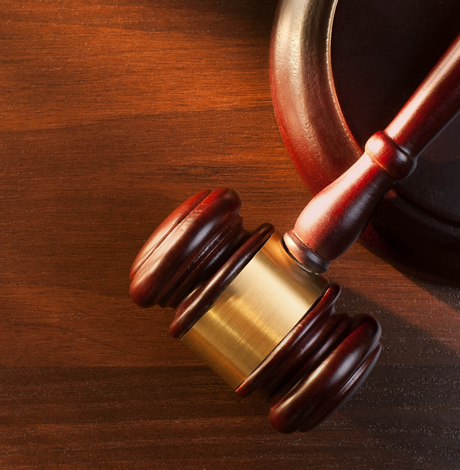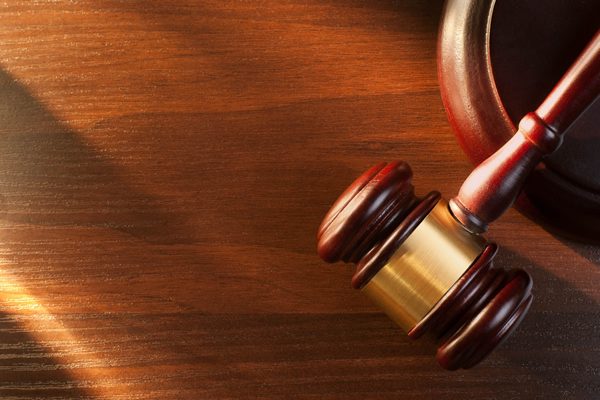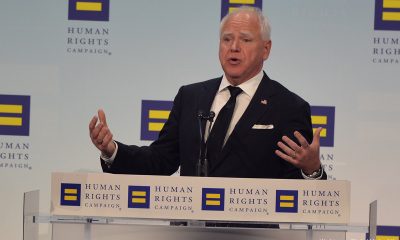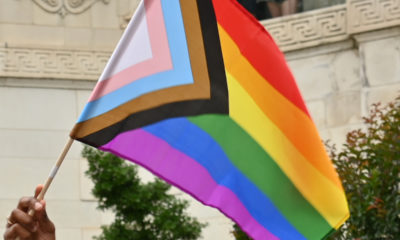National
Latest ruling could give Supreme Court crack at trans military ban
Trump administration barred from enforcing its discriminatory policy


The Supreme Court may get another crack at the transgender military ban after the latest court decision against it.
A federal appeals court has reaffirmed its decision to keep in place an injunction barring the Trump administration from enforcing its transgender military ban, setting the stage for an initial review of the policy at the U.S. Supreme Court before U.S. Associate Justice Anthony Kennedy steps down.
The U.S. Ninth Circuit Court of Appeals denied on Wednesday the U.S. Justice Department’s request to dissolve a preliminary injunction against the ban, which the administration made in the aftermath of Defense Secretary James Mattis’ report justifying President Trump’s policy
The Ninth Circuit had previously denied the Trump administration’s request to dissolve the injunction instituted by U.S. District Judge Marsha Pechman, but the Justice Department made another attempt after Mattis delivered his report to Trump in May. The administration has maintained Mattis’ recommendations justify the transgender military ban, although transgender advocates say the recommendation is filled with junk science.
But in a two-page decision, a three-judge panel on the Ninth Circuit rebuffed the Trump administration’s request to dissolve the stay, determining a reversal of the injunction would alter the status quo as litigation against the ban proceeds through the courts.
“The district court’s December 11, 2017 preliminary injunction preserves the status quo, allowing transgender service members to serve in the military in their preferred gender and receive transition-related care,” the decision says. “Appellants ask this court to stay the preliminary injunction, pending the outcome of this appeal, in order to implement a new policy. Accordingly, a stay of the preliminary injunction would upend, rather than preserve, the status quo.”
LGBT rights groups that filed the lawsuit hailed the decision as an affirmation of transgender people serving in the military and as a blow to the Trump administration. The ruling marked the second time the Ninth Circuit rebuffed the administration on the transgender military service ban, leaving the tally of eight rulings from six courts in favor of halting the policy.
The lawsuit, Karnoski v. Trump, was filed by Lambda Legal and OutServe-SLDN on behalf of nine transgender people – six current service members and three wishing to serve – as well as three organizational plaintiffs: the Human Rights Campaign, the Seattle-based Gender Justice League, and the American Military Partner Association.
Sarah McBride, a spokesperson for the Human Rights Campaign, said as a result of the decision “another court has held off Donald Trump and Mike Pence’s desperate attempts to impose their extreme anti-LGBTQ agenda on the U.S. military.”
“After a string of victories for transgender troops and enlistees at the district court level, this appeals court ruling reinforces that there is simply no need or legitimate reason to bar capable and willing transgender Americans from serving their country,” McBride added.
But the ruling from the Ninth Circuit presents the Trump administration with an opportunity — yet again — to take up the issue with the Supreme Court.
The Justice Department could file a request to stay the injunction with Kennedy, who’s responsible for issuing stays on decisions from the Ninth Circuit. Kennedy could decide the matter himself, but would likely refer the matter to the entire court for a determination.
Although Kennedy has signaled he’ll retire from the court, his departure won’t happen until the end of this month, which means he’d have an opportunity to weigh in on the matter before stepping down. It will potentially be his last decision from the bench and his last LGBT case after writing the decisions in four milestone gay rights cases after 30 years on the court.
Jon Davidson, chief counsel at Freedom for All Americans, said if the Justice Department were to file a stay request before the Supreme Court, the administration “likely will file such a motion before the end of this week.”
“I think that, assuming the Court considers any such stay request before July 31st, Justice Kennedy might well join Justices Ginsburg, Breyer, Sotomayor and Kagan in denying the request (which would mean a stay request would be denied), based on his views about the harms of the government denying individuals ‘equal dignity’ and because the Karnoski case is just one of four in which district courts have enjoined the transgender military ban,” Davidson said. “If the court does not consider a stay request until August, it may be hard for DOJ to get five votes in favor of a stay (which would require at least one of Ginsburg, Breyer, Sotomayor or Kagan to vote in favor of a stay).”
If the Justice Department were to ask the Supreme Court for a stay, it would be a reversal of its earlier position on litigation against the transgender military ban.
After the Ninth Circuit’s earlier rebuff last year of the administration on the policy, the Justice Department declared in December it wouldn’t go to the Supreme Court right away, but “wait for DOD’s study and will continue to defend the president’s and secretary of defense’s lawful authority in district court in the meantime.”
Things have changed now because the Pentagon study the Justice Department expected has come out. Nonetheless, the Trump administration is staying mum on its plans.
A Justice Department spokesperson declined to comment in response to the Washington Blade’s question on whether the administration would file a stay request before the Supreme Court.
Peter Renn, senior attorney with the Western Regional Office at Lambda Legal, affirmed the Trump administration “could seek a stay of the preliminary injunction” with the Supreme Court, but said chances for a stay are low.
“If the government does seek a stay, and the request is referred to the full Supreme Court, it is unlikely that a majority of the Supreme Court would allow the government to immediately enforce its discriminatory plan,” Renn said. “If there is a vote on a stay by the end of this month, it is difficult to imagine that Justice Kennedy will want to cap off his tenure on the court by allowing the military to toss aside transgender people, and their sacrifices for our country, as if they were disposable.”
U.S. Supreme Court
Supreme Court to consider bans on trans athletes in school sports
27 states have passed laws limiting participation in athletics programs

The U.S. Supreme Court on Thursday agreed to hear two cases involving transgender youth challenging bans prohibiting them from participating in school sports.
In Little v. Hecox, plaintiffs represented by the ACLU, Legal Voice, and the law firm Cooley are challenging Idaho’s 2020 ban, which requires sex testing to adjudicate questions of an athlete’s eligibility.
The 9th U.S. Circuit Court of Appeals described the process in a 2023 decision halting the policy’s enforcement pending an outcome in the litigation. The “sex dispute verification process, whereby any individual can ‘dispute’ the sex of any female student athlete in the state of Idaho,” the court wrote, would “require her to undergo intrusive medical procedures to verify her sex, including gynecological exams.”
In West Virginia v. B.P.J., Lambda Legal, the ACLU, the ACLU of West Virginia, and Cooley are representing a trans middle school student challenging the Mountain State’s 2021 ban on trans athletes.
The plaintiff was participating in cross country when the law was passed, taking puberty blockers that would have significantly reduced the chances that she could have a physiological advantage over cisgender peers.
“Like any other educational program, school athletic programs should be accessible for everyone regardless of their sex or transgender status,” said Joshua Block, senior counsel for the ACLU’s LGBTQ and HIV Project. “Trans kids play sports for the same reasons their peers do — to learn perseverance, dedication, teamwork, and to simply have fun with their friends,” Block said.
He added, “Categorically excluding kids from school sports just because they are transgender will only make our schools less safe and more hurtful places for all youth. We believe the lower courts were right to block these discriminatory laws, and we will continue to defend the freedom of all kids to play.”
“Our client just wants to play sports with her friends and peers,” said Lambda Legal Senior Counsel Tara Borelli. “Everyone understands the value of participating in team athletics, for fitness, leadership, socialization, and myriad other benefits.”
Borelli continued, “The U.S. Court of Appeals for the Fourth Circuit last April issued a thoughtful and thorough ruling allowing B.P.J. to continue participating in track events. That well-reasoned decision should stand the test of time, and we stand ready to defend it.”
Shortly after taking control of both legislative chambers, Republican members of Congress tried — unsuccessfully — to pass a national ban like those now enforced in 27 states since 2020.
Federal Government
UPenn erases Lia Thomas’s records as part of settlement with White House
University agreed to ban trans women from women’s sports teams

In a settlement with the Trump-Vance administration announced on Tuesday, the University of Pennsylvania will ban transgender athletes from competing and erase swimming records set by transgender former student Lia Thomas.
The U.S. Department of Education’s Office for Civil Rights found the university in violation of Title IX, the federal rights law barring sex based discrimination in educational institutions, by “permitting males to compete in women’s intercollegiate athletics and to occupy women-only intimate facilities.”
The statement issued by University of Pennsylvania President J. Larry Jameson highlighted how the law’s interpretation was changed substantially under President Donald Trump’s second term.
“The Department of Education OCR investigated the participation of one transgender athlete on the women’s swimming team three years ago, during the 2021-2022 swim season,” he wrote. “At that time, Penn was in compliance with NCAA eligibility rules and Title IX as then interpreted.”
Jameson continued, “Penn has always followed — and continues to follow — Title IX and the applicable policy of the NCAA regarding transgender athletes. NCAA eligibility rules changed in February 2025 with Executive Orders 14168 and 14201 and Penn will continue to adhere to these new rules.”
Writing that “we acknowledge that some student-athletes were disadvantaged by these rules” in place while Thomas was allowed to compete, the university president added, “We recognize this and will apologize to those who experienced a competitive disadvantage or experienced anxiety because of the policies in effect at the time.”
“Today’s resolution agreement with UPenn is yet another example of the Trump effect in action,” Education Secretary Linda McMahon said in a statement. “Thanks to the leadership of President Trump, UPenn has agreed both to apologize for its past Title IX violations and to ensure that women’s sports are protected at the university for future generations of female athletes.”
Under former President Joe Biden, the department’s Office of Civil Rights sought to protect against anti-LGBTQ discrimination in education, bringing investigations and enforcement actions in cases where school officials might, for example, require trans students to use restrooms and facilities consistent with their birth sex or fail to respond to peer harassment over their gender identity.
Much of the legal reasoning behind the Biden-Harris administration’s positions extended from the 2020 U.S. Supreme Court case Bostock v. Clayton County, which found that sex-based discrimination includes that which is based on sexual orientation or gender identity under Title VII rules covering employment practices.
The Trump-Vance administration last week put the state of California on notice that its trans athlete policies were, or once were, in violation of Title IX, which comes amid the ongoing battle with Maine over the same issue.
New York
Two teens shot steps from Stonewall Inn after NYC Pride parade
One of the victims remains in critical condition

On Sunday night, following the annual NYC Pride March, two girls were shot in Sheridan Square, feet away from the historic Stonewall Inn.
According to an NYPD report, the two girls, aged 16 and 17, were shot around 10:15 p.m. as Pride festivities began to wind down. The 16-year-old was struck in the head and, according to police sources, is said to be in critical condition, while the 17-year-old was said to be in stable condition.
The Washington Blade confirmed with the NYPD the details from the police reports and learned no arrests had been made as of noon Monday.
The shooting took place in the Greenwich Village neighborhood of Manhattan, mere feet away from the most famous gay bar in the city — if not the world — the Stonewall Inn. Earlier that day, hundreds of thousands of people marched down Christopher Street to celebrate 55 years of LGBTQ people standing up for their rights.
In June 1969, after police raided the Stonewall Inn, members of the LGBTQ community pushed back, sparking what became known as the Stonewall riots. Over the course of two days, LGBTQ New Yorkers protested the discriminatory policing of queer spaces across the city and mobilized to speak out — and throw bottles if need be — at officers attempting to suppress their existence.
The following year, LGBTQ people returned to the Stonewall Inn and marched through the same streets where queer New Yorkers had been arrested, marking the first “Gay Pride March” in history and declaring that LGBTQ people were not going anywhere.
New York State Assemblywoman Deborah Glick, whose district includes Greenwich Village, took to social media to comment on the shooting.
“After decades of peaceful Pride celebrations — this year gun fire and two people shot near the Stonewall Inn is a reminder that gun violence is everywhere,” the lesbian lawmaker said on X. “Guns are a problem despite the NRA BS.”
-

 U.S. Supreme Court2 days ago
U.S. Supreme Court2 days agoSupreme Court to consider bans on trans athletes in school sports
-

 Out & About2 days ago
Out & About2 days agoCelebrate the Fourth of July the gay way!
-

 Virginia2 days ago
Virginia2 days agoVa. court allows conversion therapy despite law banning it
-

 New York5 days ago
New York5 days agoZohran Mamdani participates in NYC Pride parade












